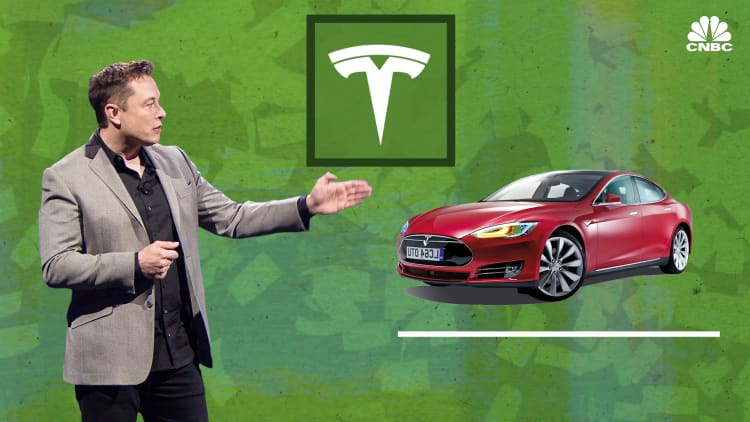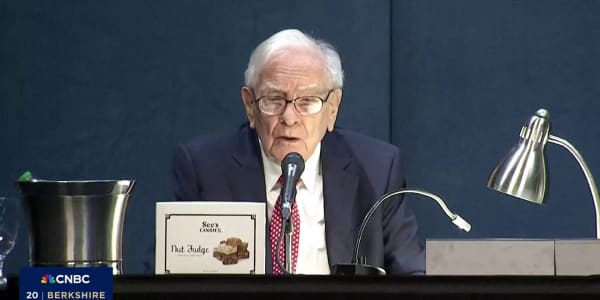Tesla's long-simmering relationship with the United Auto Workers is heating up again.
As part of an ongoing effort to organize the electric automaker's Fremont, California, assembly factory, the union has filed a string of unfair labor-practice charges and safety complaints with the National Labor Relations Board. These include allegations that Tesla restricted union-organizing efforts, tried to stop employees from discussing safety issues and retaliated against pro-union workers. Tesla has denied all the charges.
The contentious relationship between Tesla founder and CEO Elon Musk and the UAW has been going on for more than two years. Musk has criticized the union, and last May, in response to its complaints to the NLRB, he tweeted, "Nothing stopping Tesla team at our car plant from voting union. Could do so [tomorrow] if they wanted."
Legally that's true, but the workforce has never taken a vote, and the UAW won't comment as to if or when they might. So the hearing that began last summer will resume Dec. 21 at the NLRB office in Oakland when lawyers for both sides will file additional briefs with administrative law judge Amita Tracy.
While an ultimate winner in the case could take years following the judge's ruling and appeals, when it happens, the outcome could have a far-reaching, high-stakes ripple effect across Silicon Valley and beyond.
If the 400,000-member UAW prevails, the ripple effect won't necessarily impact other U.S. auto manufacturers operating in the United States. Many are already unionized, and others have avoided unionization by opening factories in non-union and right-to-work states.
But fellow tech companies could feel the effects. After all, if Tesla's workers eventually organize, employees at Amazon, Google and other non-auto tech giants could be emboldened to follow.
"It's historic that the UAW is involved with Tesla," said Harley Shaiken, a professor at the University of California Berkeley who specializes in labor issues, "and what happens here, I think, will have ramifications beyond the company itself." It would be a high-tech company that is unionized, he added, "but it would also be a start-up in the auto industry, not one of the traditional Detroit automakers that would be organized."
In the topsy-turvy realm of disruptors of traditional industries and legacy companies, Tesla is a sort of hybrid — an innovator of both renewable-energy technology and automobile manufacturing. Musk founded the company as part of his grand strategy to transform not only the auto sector but also aerospace (SpaceX), solar energy (SolarCity) and even underground tunneling (The Boring Co.). To get there, the South Africa-born entrepreneur espouses Silicon Valley's meritocracy model, where enthusiastic, highly productive executives, managers, engineers and hourly workers are well paid and receive attractive benefits and perks.
It's historic that the UAW is involved with Tesla and what happens here, I think, will have ramifications beyond the company itself.Harley Shaikenprofessor at the University of California Berkeley
For example, all employees are awarded equity when they get hired, and they receive additional awards based on performance, which they can receive in cash or in equity. The company also told CNBC it provides generous maternity and paternity leave, six choices of health plans and $130 a month in commuter benefits.
The UAW, on the other hand, insists that Tesla — with a market cap of about $61 billion — is at its core a car manufacturer, where the workforce of approximately 10,000 full-time employees already has the legal right to organize yet has been impeded in its efforts. The issue has been intensified as Tesla continues to roll out its Model 3 sedan, which has been slowed until recently by production snafus. (The company recently stated that it's on track to produce 7,000 Model 3s a month, up from its original target of 5,000.)
The Fremont factory's history
To keep things in context, it's worth considering the assembly factory's complicated history — beginning for Tesla in 2010 but dating back to the 1960s — and its relationship with the UAW.
General Motors opened the Fremont facility in 1962 and ceased operations in 1982, the nadir of the U.S. auto industry's quality, production and sales problems, exacerbated by the rise of Japan's automakers. The UAW workforce at Fremont was derided as one of the industry's worst, with reports of drinking on the job, high absenteeism, low morale and even sabotaging of cars.
Two years later the factory reopened as a joint venture between GM and Toyota — dubbed the New United Motor Manufacturing Inc., or NUMMI — and became the U.S. poster child for successfully adopting the much admired lean manufacturing and management methods developed by Toyota in Japan. In fact, NUMMI hired back a majority of the more than 5,000 UAW employees laid off by GM.
"That strategy brought an experienced workforce into the new factory," said Shaiken, "and would be a true test of the value of the Toyota production system and new ways of managing the plant." The reconstituted UAW workers were directly involved with management in decision-making and problem-solving, he explained, and NUMMI soon had among the best-quality numbers of any GM plant, high productivity and consistent profitability.
Then came the Great Recession in 2008 and the dramatic downturn in the auto sector, leading to GM's bankruptcy in 2009 and the shuttering of NUMMI a year later, putting nearly 4,500 UAW employees out of work. Toyota, which owned the factory, relocated its operations to Mississippi, Texas and Canada.
Trigger points
As fate would have it, that was when Musk was about to launch the all-electric Model S luxury sedan. He purchased much of the NUMMI plant for $42 million from Toyota, which in turn invested $50 million in the new venture. (Toyota sold the stake in 2016.)
As far as including NUMMI's UAW workers, Tesla told CNBC it initially rehired hundreds and that many still work at the factory today, but the company did not provide any hard numbers. The UAW declined to comment.
Nor will the UAW talk on the record about attempts to organize workers at Tesla since it opened, although the union reportedly spent $422,000 on such efforts in 2017.
The campaign heated up in February 2017 when Tesla production worker Jose Moran published a blog post. After citing his pride in working for a green car company, he complained of his and his co-workers' long hours, harsh conditions, work-related injuries and fears of reporting them, inadequate pay and the requirement to sign confidentiality agreements.
"Many of us have been talking about unionizing and have reached out to the United Auto Workers for support," Moran wrote.
As organizing efforts intensified, more reports of injuries and safety violations surfaced. Musk fired back with defensive tweets. The UAW filed charges with the NLRB in late August 2017, alleging that Tesla intimidated pro-union workers, followed a few months later with an unfair labor practice complaint. Finally, in June the NLRB issued a complaint against Tesla based on a series of charges from employees and set a date for the hearing to begin that month.
In prizefight fashion, both sides traded punches and counterpunches based on the charges. Over four days, three workers portrayed Tesla and Musk as anti-union; the company denied the allegations and spoke of valuing its employees. A second round of hearings was held in September, with more sparring but no knockouts, nor a final judgment.
Indeed, Judge Tracy at one point alluded to the likelihood of years of litigation in the case.
Tesla's stance
The UAW still has a presence at the Fremont factory, but any organizing efforts are essentially stuck in neutral until the case is resolved one way or the other. And even if the NLRB rules in the UAW's favor, the Fremont workers will have to vote on whether to unionize, and presently it's unknown if a majority wants to. For its part, Tesla told CNBC, Musk has been clear that it's up to the employees if they want to unionize.
In the meantime, Tesla said that its production employees start out making $19 an hour, claiming that's above the auto industry average.
"That is before equity and benefits are factored in, which are equivalent to an additional 60 percent of base pay," the company said.
Tesla also has addressed safety issues germane to the case. In October 2017 the company hired Laurie Shelby to oversee its Environmental, Health and Safety team. A year later she posted a blog on the Tesla website, outlining a number of improvements and initiatives, including a new onsite occupational health clinic, athletic trainers who roam the factory floor to preemptively identify potential injuries and a "Find-It-Fix-It" program that rewards employees who speak up about safety risks. Shelby reported that an investigation by California's Division of Occupational and Safety and Health of recordkeeping at the factory identified only two minor issues.
The company also argued that its production workers have more of a seat at the table than a union would provide. Musk's philosophy is that anybody at any level of the company can email anyone else if they have any questions, Tesla said.
Ripple effects across the Valley
The Tesla-UAW case could have ramifications on other Silicon Valley companies. Several recent developments bear watching.
At an Amazon warehouse near Minneapolis, a group of about 40 workers from East African nations organized to complain about working conditions, and the company negotiated with them on improvements — a first, according to labor organizers and researchers.
In November, after nearly 20,000 Google employees staged a walkout worldwide over the handling of sexual misconduct allegations, the company agreed to undo its mandatory arbitration clause for harassment and allow individuals to take their cases to court. Within days Facebook, Airbnb and eBay followed suit.
In December contract workers at Google, who took part in the walkout, sent a formal letter to CEO Sundar Pichai. They demanded better and equal treatment compared to that of full-time employees and alleged that Google "routinely denies [contract workers] access to information that is relevant to our jobs and our lives."
"With low unemployment, we're seeing more confidence among Silicon Valley workers speaking their mind," Shaiken said. That doesn't mean union drives are imminent, he added, "but it indicates that if workers don't have a union, they're going to try to invent one."

Note: An earlier version of this article listed the date for filing new briefs in the Tesla-UAW case briefs as Dec. 7. Following publication, the NLRB extended the date for filing new briefs to Dec. 21. CNBC has also been informed that no additional hearings will be held. The next step will be the judge's ruling, after which either or both parties can appeal the decision.






